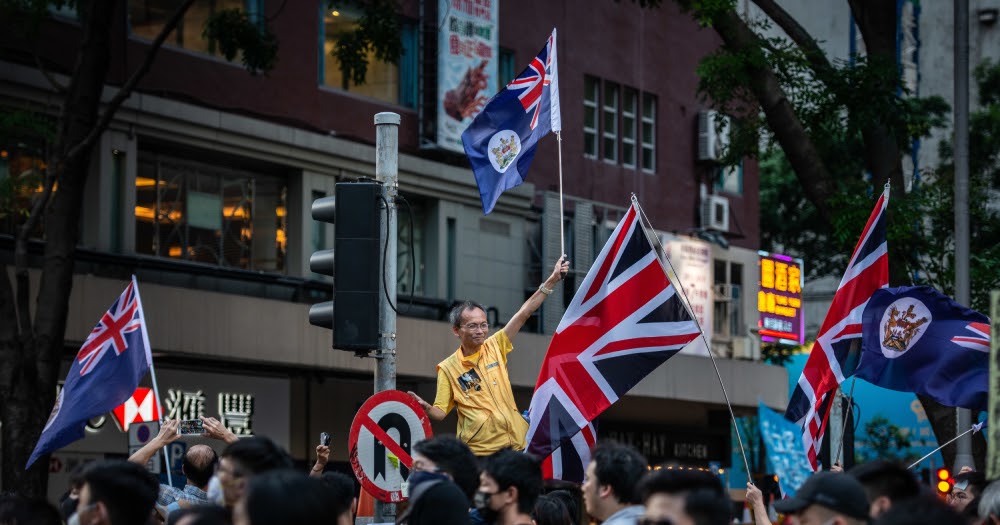
After another year of rioting and civil unrest in Hong Kong, a Freedom of Information request to the British passport office has revealed that over 200,000 travel documents – bureaucratic hangovers from the British colonial period – have been issued to Hong Kong nationals in the last ten months. This is the equivalent of five a minute.
British National Overseas (BNO) passports, introduced by the British government before the handover of Hong Kong back to China in 1997, are a “bespoke” avenue for people of Hong Kong citizenship to emigrate to Britain. It is estimated that around 3 million people, or 40% of the population, would be eligible.
In June of this year, UK Foreign Secretary Dominic Raab announced a change in BNO emigration procedures for Hong Kong nationals. According to handover-era rules, a BNO holder was entitled to 6 months stay with no access to public funds, no right to work and no leave to remain. Under Raab’s new terms, BNO holders have been granted 5 years’ right to live and work in the UK with an application path to full citizenship, and no limit on the number of dependents that emigres can bring with them.
But this change is not a benevolent show of goodwill towards Britain’s former colonial subjects. It’s a scheming, cynical geopolitical ploy in support of reactionary Hong Kong separatism, and amounts to the UK reneging on its promises. China has of course harshly criticised this move, branding it an interference in its domestic affairs; both sides see the other as a major antagonist on the world stage, pushing the terms of the 1984 joint handover declaration to the breaking point.
Beijing says it reserves the right to not recognise the BNO as a valid travel document – but our government estimates over 300,000 Hong Kong nationals will come to live in the UK over the next four years. This is an exodus.

Cynical extensions of goodwill to select international citizens to further imperialist interests are far from unheard of in modern history. After the victory of the Cuban revolution against the Batista regime, waves of wealthy ex-landowners, businessmen and US compradors streamed from Cuba to the US to flee revolutionary justice and social reorganisation. The preferential treatment of the gusanos and its motivation is comparable to the UK’s Hong Kong emigration reform – both are thinly veiled attacks on states breaking out alignment with Western imperialism, couched firmly in the class character of those targeted.
America’s Cuban diaspora, centred in Miami, became a hotbed and voting bloc for right-wing sentiment, terrorism and reaction. It was from this base that the 1961 Bay of Pigs invasion was launched in an abortive attempt to overthrow socialism in Cuba. In more recent years, the anti-communism of Miami-Cuban gusanos has been a key factor in Trump’s Florida wins in the last two US presidential elections.
Will the coming Hong Kong emigre population carry over the same anti-communist sentiment from its opposition to the CCP? Can we allow Britain, like the Cold War-era US, to import wholesale a voting bloc of right-wing reactionaries that any left movement or party would have to overcome?
The UK government’s preferential treatment of ex-colonial subjects is plainly not indicative of a more progressive attitude towards immigration. The refugee crises of the last 10 years, fueled by imperialism and Western intervention, has led to shanty towns in Calais, children dying in the cold waters of the Channel and a “hostile environment” policy designed to make the lives of asylum seekers so unbearable that they might pack up and leave. The Windrush generation, invited to Britain by the government to help rebuild our country and support the welfare state, has been subject to humiliation, deportation and neglect in recent years — their legal rights and access to services denied, in almost 100 cases wrongly deported to countries that have never been their homes.
Why then such benevolence to Hong Kong nationals? It can only be understood as direct interference in China’s affairs, betraying Britain’s unswayed colonial attitude towards the former trading post. As the new Cold War with China heats up on all fronts, Britain is among the imperialist powers ramping up its geopolitical arsenal — from the cynical exaggeration of Beijing’s Uyghur policy to economic sanctions on Huawei.
As Marxist anti-imperialists, we must see through the hawkish posturing of capitalist governments of all stripes, recognising that animosity between the west and China can only be a threat to the global working class. And as communists of Britain, we must fight to make sure that our sordid colonial past does not influence our foreign policy today.
Shea Stewart




